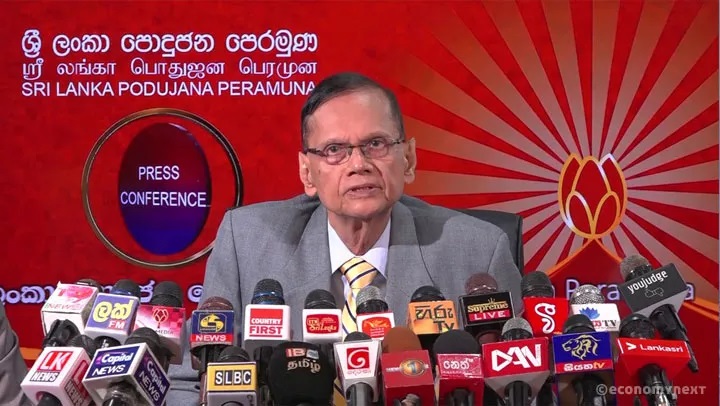Former External Affairs Minister Prof. G. L. Peiris, MP, said that Speaker Mahinda Yapa Abeywardena’s refusal to accept that Supreme Court recommendations hadn’t been accommodated in ‘Online Safety Act No 09 of 2024’, would undermine their faith in the committee stage of a particular Bill.
The dissident SLPP MP said so when The Island sought his opinion on the SC determination on the ‘Anti-Terrorism’ Bill.
Against the backdrop of the continuing controversy over the circumstances under which the Parliament enacted the ‘Online Safety Bill’, the Opposition was seriously concerned about the Wickremesinghe-Rajapaksa government adopting the same strategy in passing the ‘Anti-Terrorism’ Bill.
Prof. Peiris emphasised that the Speaker even ignored the Human Rights Commission advice that SC’s recommendations hadn’t been accommodated. The academic, who recently aligned himself with the SJB, said that the genuine Opposition shared his concerns.
Several parties challenged the ‘Anti-Terrorism’ Bill in the SC in terms of Article 121(1) of the Constitution. The determination of the SC as to the Constitutionality of the Bill concluded as—
(a) Clause 3, Clause 42, Clause 53, and Clause 70 of the Bill are inconsistent with Article 12(1) of the Constitution and required a special majority to be passed by Parliament.
(b) However, the SC stated that the said inconsistencies can be ceased if the said Clauses are amended as per the Determination of the Court.
(b) Clause 4 has to be suitably amended as per the Supreme Court Determination. Clause 72 (1) is unconstitutional and needs to be passed by a Special Majority and a Referendum. The unconstitutionality will cease if this Clause is amended as per the Determination of the Supreme Court.
(c) Correspondingly, Clause 72(2) must be amended in accordance with the Determination.
(d) Clause 75 (3) infringed the Article 4 (c) read with Article 3 of the Constitution and required 2/3 majority and a Referendum. The invalidity will cease 7 upon the amendments suggested in the Determination.
(f) Clause 83 (7) requires a special majority to be passed into law. It has to be suitably amended as per the Supreme Court Determination.
Further, the Supreme Court has determined that subject to the amendments that have adumbrated to the provisions of the Bill by the Supreme Court, the Bill could be enacted into law with a Simple Majority only if the amendments determined by the Supreme Court are introduced to the provisions.
Prof Peiris said that the crisis highlighted the need for ex post facto judicial review, for which there is at present no provision in Sri Lanka. The position is otherwise in countries like the USA and India where an Act of Parliament can be impugned, even after completion of the legislative process, on the ground of conflict with imperative provisions of the Constitution. Such provision existed in Sri Lanka prior to the First Republican Constitution of 1972.
The former minister said that in the draft Constitution Bill which he presented to Parliament on 3 August 2000 on behalf of the Government of President CBK, appropriate provision in this regard was included. “Unfortunately, the Constitution was burnt in the Chamber of Parliament. This gap in our law should be filled, in my view, when a comprehensive exercise in constitutional reform is undertaken by a new Administration after the conduct of national elections this year.”





